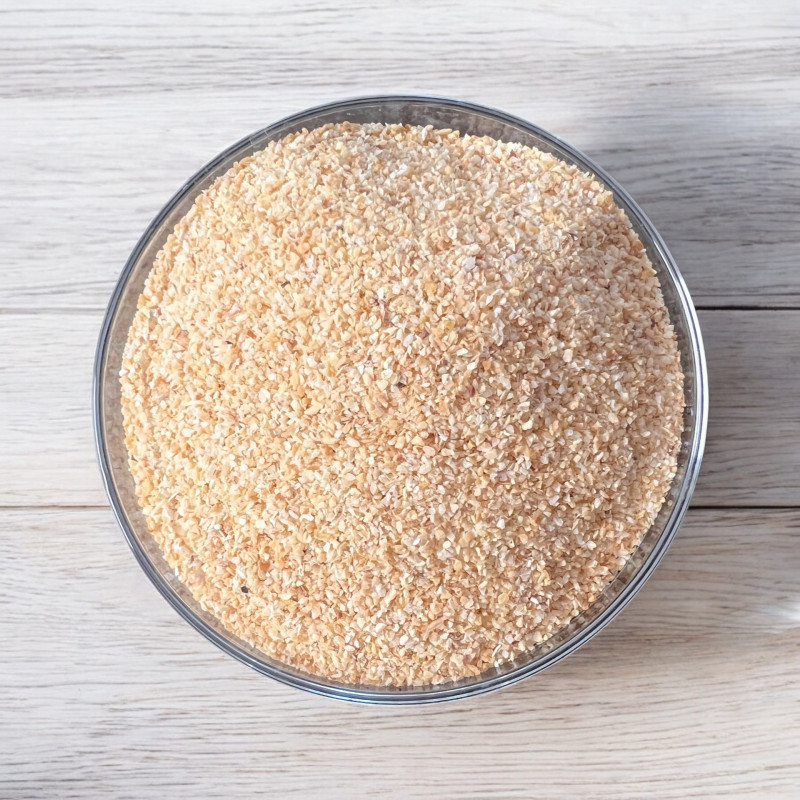
Reference: EPI230115


It’s convenient, easy to digest, and beautifully aromatic.
Perfect for salads, raw vegetables, vegetables, meats, sauces, compound butters, and countless culinary preparations.
 Delivery
Delivery
Mondial Relay
 Returns
Returns
See conditions
 Payments
Payments
100% secure
Livré en sachet refermable
°°°
°°°
Culinary Uses:
Garlic is a natural product, so its color can vary from cream to light yellow, depending on the batch.
Generally, 100g of dehydrated garlic is equivalent to 500g of fresh garlic.
Garlic’s culinary uses are so vast it’s impossible to cover them all! But when thinking of garlic, Provence comes to mind, where it deliciously enhances most dishes: bouillabaisse, sauces, and aioli.
Interestingly, dehydrated garlic is highly digestible, even when uncooked, unlike raw garlic…! This makes it a real joy to use. It’s perfect for dishes that aren’t cooked or those with short cooking times that wouldn’t fully cook raw garlic.
Dehydrated garlic is a key ingredient in salad mixes and works wonders in all types of salads, with just a quick rehydration in a bit of water. It pairs beautifully with shallots or onions in salads and many other dishes.
You can sprinkle it on green vegetables, such as green beans sautéed in a bit of butter, or Provençal tomatoes (with basil or oregano) cooked in olive oil.
Once rehydrated, you can use it to make garlic butter for escargot or simply sprinkle it over buttered pasta.
It’s also wonderful on a slice of lamb served medium-rare! Garlic is an ingredient in several of our spice blends: rouille, chicken seasoning, pasta seasoning, and even a small amount in Madras curry!
Note: Garlic granules may sometimes show slight clumping, which does not affect the product's quality. These clumps can be easily broken by pressing on them.
Who Am I?
Scientific Name: Allium sativum
Common Names: Common garlic, culinary garlic
Garlic is a perennial plant, with its bulbs—a key element in Provençal cuisine—having a strong aroma and flavor. The bulb, known as a "head of garlic," consists of several "cloves." The entire plant, even the flowers, carries this distinctive garlic scent. There are two main types of garlic:
Autumn Garlic: Planted from September to November and harvested between April and July, this includes white or purple garlic, which matures earlier but is more sensitive to cold, keeping until December or January.
Spring Garlic: Planted in December or January, this includes pink garlic, harvested in July and keeping until the following spring.
In France, certain varieties are labeled according to their terroir. Globally, there are many different varieties based on climate and soil.
Garlic is typically propagated by planting cloves, as seed production is rare.
When cooking fresh garlic, it’s recommended to remove the sprout, as it may be less digestible than the rest of the clove. Personally, I find raw or lightly cooked garlic difficult to digest, so I much prefer dehydrated garlic. However, when well-cooked, I have no issue with fresh garlic, sprout included!
Garlic contains several vitamins (A, B1, B2, C, E), natural antibiotics, essential oils, minerals, and trace elements. It stimulates the production of beneficial bacteria in the intestines.
A Bit of History:
Garlic has been used in food for over 5,000 years, particularly in Egypt, ancient Greece, and Rome, where it was believed to have strengthening properties. Crusaders helped spread it throughout Europe, where it was credited with various virtues, even believed to ward off the plague!
It seems that Christopher Columbus introduced garlic to the Americas. Today, garlic is cultivated worldwide.
Throughout history, garlic has been associated with various powers, from warding off witches, vampires, and even the devil to protecting sailors from bad luck and storms.
Data sheet
 Rita Z.
Rita Z.
Top
 Paulette G.
Paulette G.
Ail semoule ayant une bonne odeur .
 Laurence P.
Laurence P.
Excellent produit !
 Martine B.
Martine B.
Parfait
 Eric A.
Eric A.
Parfait
 Jeanine B.
Jeanine B.
excellent
 Denis G.
Denis G.
Top (produit et emballage hermétique) !

 Rita Z.
Rita Z.
Top
 Paulette G.
Paulette G.
Ail semoule ayant une bonne odeur .
 Laurence P.
Laurence P.
Excellent produit !
 Martine B.
Martine B.
Parfait
 Eric A.
Eric A.
Parfait
 Jeanine B.
Jeanine B.
excellent
 Denis G.
Denis G.
Top (produit et emballage hermétique) !

Reference: EPI230115
Reference: 30204501
Reference: 508212501
Reference: 20815801
Reference: 6L5609803
Reference: Harissa
Reference: 3N7201902
Reference: 20703402
Reference: 3N7153402
Reference: 20820902
Reference: gingembreM
Reference: 00033929-0001
Reference: gingembreE
Reference: 2071570
Reference: 3N7153402
Reference: anisvertM
Reference: 20211003
Reference: 208033101
Reference: 208022801

It’s convenient, easy to digest, and beautifully aromatic.
Perfect for salads, raw vegetables, vegetables, meats, sauces, compound butters, and countless culinary preparations.